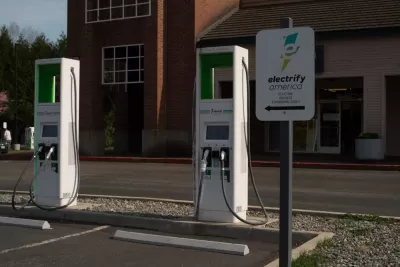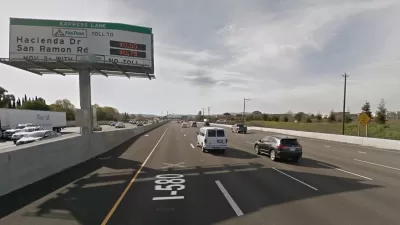Washington Gov. Jay Insee distinguished himself in the 2020 presidential Democratic primary as the "climate candidate," yet he vetoed a section of a transportation electrification bill that set a goal of ending sales of gas-powered cars by 2030.

What's more controversial than transitioning from carbon-emitting internal combustion engines to zero-emissions electric power in passenger vehicles? For Gov. Jay Inslee of Washington, who proposed banning the sale of internal combustion-powered vehicles by 2035 as a candidate in the 2020 Democratic primary, road funding, rather than tailpipe emissions, proved to be a bigger challenge.
Jameson Dow has been covering the legislation for Electrek, a news and commentary site covering the transition from fossil-fuel transport to electric transport, since February when the "Washington state’s House Transportation Committee voted 17-12 to advance a bill [pdf] requiring all light-duty vehicles of model year 2030 and later registered in the state to be electric." The bill was sponsored by Coltura, a Washington-based environmental group whose goal is to phase out gasoline.
The mandate changed to a goal when the "legislature passed 'Clean Cars 2030,' a bill setting a goal to require all light-duty vehicles of model year 2030 or later to be electric," wrote Dow on April 15. "The bill passed as part of a larger package directing utilities to prepare the state for all-electric transportation."
Should electric vehicles pay for roads? How?
House Bill 1287, "Concerning preparedness for a zero emissions transportation future," not only dealt with the need for battery-electric and fuel cell vehicle infrastructure but how to transition from a gas tax-funded state transportation budget that doesn't apply to vehicles that don't consume gasoline or diesel fuel. An amendment in the engrossed second substitute bill [pdf] linked the two objectives:
A goal is established that all publicly and privately owned passenger and light duty vehicles of model year 2030 or later sold, purchased, or registered in Washington state be electric vehicles, contingent upon a road usage charge or equivalent vehicle miles traveled fee or tax being in effect in Washington with at least 75 percent of registered passenger and light duty vehicles in Washington participating.
Gov. Inslee "had been expected to sign the bill this morning, but vetoed the 100% EV plan stating that 'achieving a goal of 100% electric vehicles is too important to tie to the implementation of a separate policy like the road usage charge,'" wrote Dow on May 13.
He did not specifically take issue with either the road usage fee or the ban on new gas vehicles, but rather with the fact that the two were tied together – that for the gas car ban to happen, the road usage fee must be implemented first.
Inslee explained why he applied the line-item veto in a Google document, also included in the source article.
"It is not clear what will happen to the effort from here" adds Dow. "The legislature may decide to send another bill to Inslee’s desk without tying the two parts together, or Inslee could theoretically figure out a way to set some sort of goal by executive order."
While many states, including Washington, have operated road usage charge pilot programs, only Oregon and Utah operate actual road usage charge programs with paying motorists, though both are very limited in participation.
Related in Planetizen:
-
Gone by 2035: Gas-Powered Car Sales Have an Expiration Date in California, September 24, 2020
-
Utah Officials Want to Replace the State Gas Tax [See section: Washington state has answers], March 3, 2020
-
Washington Attempts to Adopt a Cleaner Cars and Clean Fuels Programs, January 21, 2020
-
Phasing Out the Internal Combustion Engine No Easy Task, September 18, 2018
-
12-Cent Gas Tax Increase Deal in Washington State, June 30, 2015
FULL STORY: WA Gov. Inslee vetoes 2030 gas car ban, citing road usage fee concerns

Maui's Vacation Rental Debate Turns Ugly
Verbal attacks, misinformation campaigns and fistfights plague a high-stakes debate to convert thousands of vacation rentals into long-term housing.

Planetizen Federal Action Tracker
A weekly monitor of how Trump’s orders and actions are impacting planners and planning in America.

In Urban Planning, AI Prompting Could be the New Design Thinking
Creativity has long been key to great urban design. What if we see AI as our new creative partner?

California Creates Housing-Focused Agency
Previously, the state’s housing and homelessness programs fell under a grabbag department that also regulates the alcohol industry, car mechanics, and horse racing.

Chicago’s Ghost Rails
Just beneath the surface of the modern city lie the remnants of its expansive early 20th-century streetcar system.

Baker Creek Pavilion: Blending Nature and Architecture in Knoxville
Knoxville’s urban wilderness planning initiative unveils the "Baker Creek Pavilion" to increase the city's access to green spaces.
Urban Design for Planners 1: Software Tools
This six-course series explores essential urban design concepts using open source software and equips planners with the tools they need to participate fully in the urban design process.
Planning for Universal Design
Learn the tools for implementing Universal Design in planning regulations.
planning NEXT
Appalachian Highlands Housing Partners
Mpact (founded as Rail~Volution)
City of Camden Redevelopment Agency
City of Astoria
City of Portland
City of Laramie





























